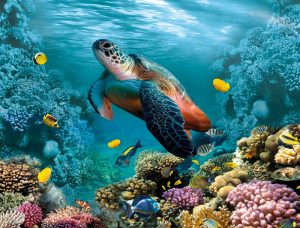Researchers at the University of Derby are partnering with conservation organisations to carry out studies that could help safeguard the future of the world’s vulnerable sea turtle species.
Working with the Olive Ridley Project (ORP) and the Environmental Protection Agency (EPA) in the Maldives, the team are working on two projects funded by Friends of Frontiers. The first will investigate the genetics of hawksbill turtles across the Maldives, an island country in the Indian Ocean. One of the most commonly sighted turtle species among the reefs of the Maldives, the hawksbill – with its distinctive hawk-like beak – is critically endangered and attracts tourists from all over the world.

The analysis and data will be handled by ORP’s Senior Project Scientist Dr Stephanie Köhnk, Lead Veterinary Surgeon Dr Max Polyak, and CEO and Founder Dr Martin Stelfox, a University of Derby graduate, working with Professor Michael Sweet, Professor of Molecular Ecology at the University of Derby.
Professor Sweet said: “The findings from projects like these will help us conserve turtles throughout the Indian Ocean, identifying population sources and possible sinks or bottlenecks. Based on our earlier work, we believe we will further highlight that the conservation of turtles shouldn’t just lie with single governments as the threats faced by these majestic migrating beauties transcends boundaries and need stringent international legislation, such as more Marine Protected Areas.
“Turtles are a beautiful sight to behold in their natural environment, and are part of the rich biodiversity that attracts more than a million visitors to the Maldives each year. We hope that this study will contribute to worldwide efforts to protect them and help their populations to recover.”
The second study will explore the use of natural probiotics to support the rehabilitation of turtles rescued from ghost gear – discarded or abandoned nets in which turtles can become entangled. The ORP was the first organisation to create a veterinarian-led rehabilitation centre in the Maldives. Olive ridley turtles, from which the charity takes its name, is another one of the five species of sea turtle found in the Maldives, and is the one most frequently found entangled in the ghost nets.
Professor Sweet and his team at the University have been carrying out extensive studies into the role of natural probiotics in supporting communities of coral and seagrass. This new study applies the same basic principles of the research to turtles. Earlier this year, Professor Sweet took a group of undergraduate students to the Maldives. While on the visit, the students learned about tropical marine biology in general, including coral conservation and restoration, the nurseries of seagrass meadows and turtles.
Professor Sweet explained: “In addition to the undergraduate field trip, we have also brought back the first set of samples for the genetic study. These samples were gathered by ORP and EPA staff over the last few months and will be our starting block for understanding how diverse or conserved the Maldivian turtle population is.
“Next, we need to understand the natural gut microbiome of the turtles for the probiotic project. To do this we will culture up the good bacteria in our molecular laboratories at the University and develop a cocktail which is potentially beneficial to gut health. We can then see if dosing our rehabilitated turtles with the probiotics improves their health after the use of antibiotics, which is often vital to allow them to recover from the wounds.”
The Olive Ridley Project, a registered charity with offices in the UK, Maldives and Kenya, was founded by Dr Martin Stelfox and Professor Sweet, who was one of the first trustees on the board back in 2016 and continues to act on the board of trustees. The charity’s mission is to protect sea turtles and their habitats through scientific research, education and outreach, and rescue and rehabilitation.
Dr Martin Stelfox, CEO of the Olive Ridley Project, said: “Through pioneering genetic and gut microbiome studies on sea turtles, ORP exemplifies a commitment to advancing the frontiers of science and conservation. Our ongoing collaboration with the University of Derby stands as a testament to our dedication in pushing boundaries, fostering innovation, and nurturing strong scientific partnerships. We take pride in these endeavours as they deepen our understanding and strengthen our resolve to protect sea turtles and their habitats.”
Olivia Marples, a third-year Zoology student at the University of Derby, took part in the visit to the Maldives. She said: “It was a once in a lifetime experience, where you get to put what you learn in the classroom into practice. The highlight was snorkelling with sea turtles, sharks and rays. The experience has made me more passionate about marine biology, especially working towards a career in sea turtle conservation.”




